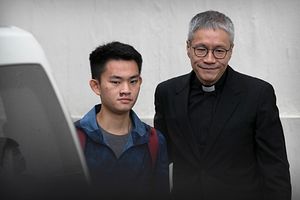Taiwan and Hong Kong have spent the week sparring over how to handle the case of murder suspect Chan Tong-kai, who is wanted in Taiwan for allegedly murdering his pregnant girlfriend, Poon Hiu-wing, in February 2018.
The case of Chan, 20, was cited by Hong Kong authorities as the inspiration for the deeply unpopular extradition bill which sparked ongoing pro-democracy protests in the city. The bill was formally withdrawn by the Hong Kong government on Wednesday.
Taiwan has requested to send police officers and prosecutors to Hong Kong to bring Chan back to the country. Hong Kong authorities initially deemed this request “totally unacceptable.”
Chan has said he wishes to surrender to Taiwanese authorities. He was released from a Hong Kong prison on Wednesday, where he had served 19 months in custody on money laundering charges. Taiwan, not Hong Kong, retains jurisdiction over the murder case.
On Thursday, the minister of Taiwan’s Mainland Affairs Council said the government had set up a “contact channel” for Chan to inform Taiwanese authorities when he is ready to return to the country and surrender.
Taiwanese authorities initially said they would not allow Chan to travel to Taiwan and turn himself in, fearing an effort by Beijing to undermine Taiwan’s sovereignty by influencing Taiwan to comply by the terms of Hong Kong, which is unwilling to appear to recognize the government of Taiwan. Premier Su Tseng-chang said Monday that Taiwan would not “fall into China’s trap on the matter,” and officials in Taiwan’s Mainland Affairs Council said Hong Kong had not responded to previous requests to send the suspect to Taiwan to answer questions.
But Taiwan reversed course. President Tsai Ing-wen said on Tuesday that Taiwan retained jurisdiction over Chan’s case and formally asked Hong Kong to allow Taiwanese officials to travel to the city and bring back the suspect. In a Facebook post, Tsai said the officials would “escort” Chan from Hong Kong to Taiwan.
On Wednesday, Tsai said Taiwan would “handle it” if Hong Kong authorities would not exercise responsibility in the case, saying Chan is a fugitive rather than an individual tourist. In a statement, the Mainland Affairs Council called Hong Kong’s decision to allow Chan to travel to Taiwan alone “bizarre” and accused authorities of “letting Hong Kong turn into a criminal paradise where murderers can wander around.”
Hong Kong authorities said later Wednesday they would cooperate with Taiwan’s requests for evidence in Chan’s case and would allow the suspect to bring evidence with him to Taiwan should he choose to travel there and surrender.
A legal expert told Taiwan’s Central News Agency on Wednesday that, should Chan travel to Taiwan, he would likely be arrested upon arrival at the airport and immediately transferred to a prosecutor’s office for questioning. The expert added that Hong Kong and Taiwan have facilitated the handover of criminal suspects in the past, despite a lack of an extradition agreement between the two.
In 2016, three murder suspects were expelled from Taiwan and accompanied by nine Hong Kong police offers on their flight back, where they were arrested upon landing. Chan, however, has been a free man in Hong Kong since yesterday, complicating the ability for the two governments to cooperate unofficially.
Tsai had come under criticism in Taiwan for initially signaling a refusal to grant Chan entry should he fly to Taiwan of his own volition.
On Tuesday, Kuomintang presidential candidate Han Kuo-yu, who is Tsai’s main opponent in the country’s upcoming elections in January, criticized Tsai over her initial unwillingness to accept Chan.
But Hong Kong’s reluctance to share its own evidence and to cooperate with Taiwanese authorities has justified Taiwan’s caution in facilitating Chan’s return to Taiwan, according to legal experts who spoke to the New York Times and South China Morning Post.
Chan left Taiwan last year before Taiwanese authorities identified him as the main suspect in the murder of Poon. Her body was found near a subway station in New Taipei City after Chan told Hong Kong police he had strangled Poon and left her body in a suitcase.
Hong Kong introduced its controversial extradition bill after claiming it was necessary to send Chan to Taiwan to face prosecution. But the bill sparked fears that Hong Kong nationals could be extradited to China, leading to ongoing pro-democracy protests that entered their 20th week on Sunday, October 20.
Taiwan had previously said it would not cooperate with the Hong Kong extradition bill should it be passed.

































